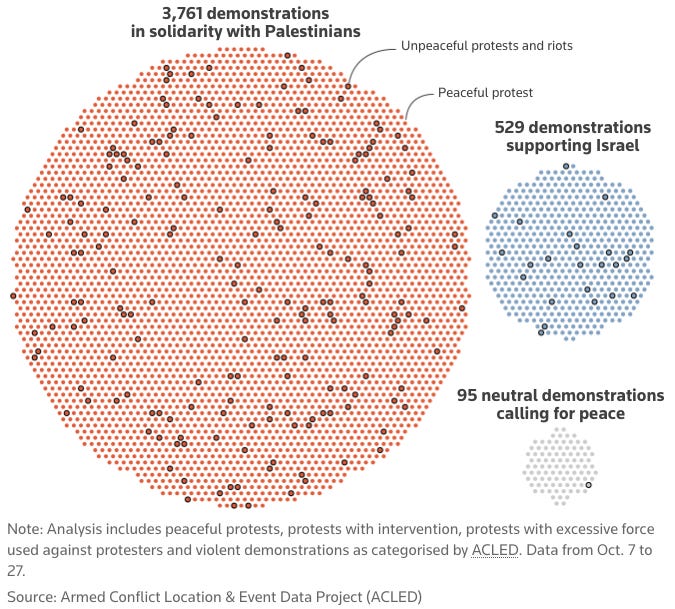This week…
Your reading time is about 7 minutes. Let’s start.
Sam Altman is booted out from OpenAI’s CEO seat for dishonesty. That drama is all over the media, so let’s keep it there because it’s not even the biggest one this week.
Because bigger than Altman’s departure is the Osama bin Laden letter that disappeared after it was widely shared on social media. The Guardian deleted “Letter to America,” which was published on the site 20 years ago but recently went viral. A spokesperson for The Guardian told 404 Media that the transcript was taken down because it was shared without its original context and decided to direct readers to the news article that contextualised it instead.12
Of course, TikTok bore the brunt of the blame. After all, a Pew Research Center survey conducted between September 25th and October 1st showed that more Americans are getting their news on TikTok – the opposite of what is observed on most other social media sites.3 Some of the first TikToks on the manifesto were created by – get this – health and wellness influencers(!?), but its circulation actually gained greater traction on XTwitter before TikTok started cracking down on related posts. In fact, TikTok went on an overdrive, even suppressing posts critical of the letter.
I think the Western antagonisation of TikTok is fascinating because it feels tinged with xenophobic undertones. The U.S., the land of the free-ish, called for an outright ban of the app instead of regulating Big Tech (all of them, including XTwitter).
For its part, TikTok responded4 to calls to ban the app in the U.S. after accusations of anti-Israel bias and propagandising young U.S. users by showing that pro-Palestine hashtags vastly outnumber pro-Israel hashtags on other platforms, too, i.e. Instagram and Facebook. They also used polling data from Gallup and Pew Research, including from surveys done way before TikTok’s existence, to demonstrate that attitudes among young people have skewed toward Palestine without its influence. They also insisted their algorithm doesn’t take sides and that they are “rapidly and robustly” responding to the Israel-Gaza situation.
You know, unlike XTwitter. Even though the Center for Countering Digital Hate said that it failed to remove 98 per cent of posts reported for hate and extremism,5 federal government-owned devices in Australia, Belgium, Canada, Norway, and the U.K., among others, can still let their users doom scroll The Bad Place – but not TikTok – where blue-checkers glorify Nazism, deny the Holocaust, incite violence against Muslims, Palestinians, and Jewish people, and so on. Sometimes, with the platform owner’s own personal stamp of approval.6
And now, a selection of top stories on my radar, a few personal recommendations, and the chart of the week.
ICYMI: The Previous Block was on the use of WhatsApp Channel by news publishers, as well as AI use in modelling and music videos. CORRECTION NOTICE: None notified. Nepal to ban TikTok, alleges damaging social impact
Gopal Sharma for Reuters:
Nepal said on Monday it would ban Chinese-owned TikTok, adding that social harmony and goodwill were being disturbed by "misuse" of the popular video app and there was rising demand to control it.
TikTok, owned by Chinese tech company ByteDance, has already been either partially or completely banned by other countries, with many citing security concerns.
More than 1,600 TikTok-related cyber crime cases have been registered over the last four years in Nepal, according to local media reports.
Nepal's Minister for Communications and Information Technology Rekha Sharma said the decision to ban TikTok had been made at a cabinet meeting earlier on Monday.
Just ban the Internet, honestly.
President’s war against ‘fake news’ raises alarms in South Korea
Choe Sang-Hun for The Japan Times:
The president, a former prosecutor, is turning to lawsuits, state regulators and criminal investigations to clamp down on speech that he calls disinformation, efforts that have largely been aimed at news organisations. Since [Yoon Suk-yeol] was elected last year, police and prosecutors have repeatedly raided the homes and newsrooms of journalists whom his office has accused of spreading "fake news.”
Some South Koreans accuse Yoon of repurposing the expression as justification for defamation suits and to mobilise prosecutors and regulators to threaten penalties and criminal investigations. Many are exasperated that their leader has adopted the phrase, a rallying cry for strongmen around the world that is also further dividing an increasingly polarised electorate at home.
Sounds familiar.
Why is so much anti-Palestine disinformation coming from India?
Sophia Khatsenkova for Euronews:
A report by Logically Facts, an organisation that specialises in monitoring misinformation, also explains that this disinformation campaign comes in the run-up to the Indian elections, which will take place in the spring of 2024.
Anti-Muslim sentiment has been on the rise in India since Prime Minister Narendra Modi and his ruling Bharatiya Janata Party (BPJ) came to power in 2014.
Regularly accused of stigmatising Muslims, the BJP is staunchly opposed to its pro-Palestine counterpart, the Congress.
According to a report published in September by Hindutva Watch, a Washington-based group monitoring attacks on minorities, 255 documented incidents of hate speech incidents targeting Muslims were recorded in the first half of 2023.
Overwhelmingly, 80% of these events occurred in BJP-ruled states and union territories.
Moreover, Nicolas Blarel [an expert on Indian politics and associate professor of International relations at Leiden University] has noticed that India has grown more fascinated with Israel over the past decades.
"Supporters of the BJP consider they face similar threats as Israel when it comes to terrorism," he said.
Buckle up; the 2024 elections worldwide will be quite the ride.
What I read, listen, and watch…
I’m reading The Right to Maim. Jasbir K. Puar made the entire text available for free on her website.
I’m listening to “The Information War in Gaza” on Tech Won’t Save Us. Paris Marx is joined by digital rights advocate and researcher Marwa Fatafta to discuss the ongoing Israeli campaign in Gaza and the importance of social media for sharing what’s happening on the ground.
I’m watching Gadis Kretek on Netflix. I miss the sound and smell of kretek. I also enjoy this XTwitter thread on the kebaya and kain batik styling decisions for the main character.
Other curious links:
“No, you’re not that good at detecting fake videos − 2 misinformation experts explain why and how you can develop the power to resist these deceptions” by Sam Wineburg, Stanford University, and Michael Caulfield, University of Washington for The Conversation.
“Should the media tell you when they use AI to report the news? What consumers should know” by François Nel for The Conversation.
“Worried about AI hijacking your voice for a deepfake? This tool could help” by Chloe Veltman for NPR.
“YouTube cracks down on synthetic media with AI disclosure requirement” by Benj Edwards for Ars Technica.
“That hyped up AI pin made two idiotic mistakes in its launch video” by Maggie Harrison for Futurism.
“How digital twins may enable personalised health treatment” by Linda Geddes for The Guardian.
“What the Global South could teach rich countries about health care — if they‘d listen” by Kamala Thiagarajan for NPR.
“How will Southeast Asian terror groups capitalise on the Israel-Hamas war?” by Zam Yusa for The Diplomat.
“El Chat GPT todavía no entiende el español” por Pablo Esteban en Página 12.
« Les technologies sont devenues de nouveaux oppresseurs en puissance » par Marcel Kuntz dans L’Express.
Chart of the week
Reuters’ Prasanta Kumar Dutta mapped pro-Palestinian, pro-Israel, and neutral public demonstrations that took place around the world between October 7th and 27th, showing their size and whether violence was involved.
And one more thing
If Gaza were in your city, how much would be destroyed? by Al Jazeera. The AJLabs team overlaid Gaza over the maps of major cities worldwide, including Toronto, Kuala Lumpur, and London, to show the relative destruction of major landmarks in those areas.
The Starting Block is a weekly collection of annotated media observations focusing on disinformation, data, and democracy beyond the Anglo-Western sphere. Read the archives. Find me on Instagram, LinkedIn, and Threads. Learn more about what I do here. Send questions, corrections, and suggestions to tinacarmillia@substack.com.
Koebler, Jason. “The Guardian Deletes Osama Bin Laden’s ‘Letter to America’ Because It Went Viral on TikTok.” 404 Media, 16 Nov. 2023, www.404media.co/guardian-deletes-osama-bin-ladens-letter-to-america-after-it-goes-viral-on-tiktok/. Accessed 19 Nov. 2023.
Broderick, Ryan. “TikTok Teens Aren’t Stanning Osama Bin Laden.” Garbage Day, 17 Nov. 2023, www.garbageday.email/p/tiktok-teens-arent-stanning-osama. Accessed 19 Nov. 2023.
Matsa, Katerina Eva. “More Americans Are Getting News on TikTok, Bucking the Trend Seen on Most Other Social Media Sites.” Pew Research Center, 15 Nov. 2023, www.pewresearch.org/short-reads/2023/11/15/more-americans-are-getting-news-on-tiktok-bucking-the-trend-seen-on-most-other-social-media-sites/. Accessed 19 Nov. 2023.
“The truth about TikTok hashtags and content during the Israel-Hamas war.” TikTok, 13 Nov. 2023, newsroom.tiktok.com/en-us/the-truth-about-tiktok-hashtags-and-content-during-the-israel-hamas-war. Accessed 19 Nov. 2023.
Ortiz, Ana Guzman. “NEW: X Fails to Act on Antisemitism, Anti-Muslim Hate, and Anti-Palestinian Hate.” Center for Countering Digital Hate, 14 Nov. 2023, counterhate.com/blog/israel-gaza-crisis-x-fails-to-remove-98-of-posts-reported-by-the-ccdh-for-hate-and-extremism/. Accessed 19 Nov. 2023.
Hatmaker, Taylor. “Backlash Builds after Elon Musk Called an Antisemitic Conspiracy Theory the ‘Actual Truth.’” TechCrunch, 18 Nov. 2023, techcrunch.com/2023/11/17/elon-musk-x-antisemitic-conspiracy-theory-actual-truth/. Accessed 19 Nov. 2023.







Oups... bold of you to claim the Altman news isn't as big as it's turning out to be.. 😅